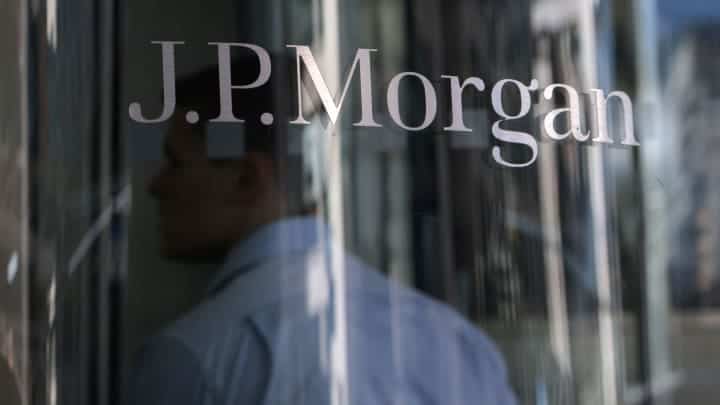Stocks finished lower on Friday but logged weekly gains across the board while shares of JPMorgan (JPM) rallied more than 7% following a strong quarterly earnings report.
At the closing bell on Friday the S&P 500 (^GSPC) was off 0.21%, the Dow Jones Industrial Average (^DJI) was down 0.42%, and the tech-heavy Nasdaq Composite (^IXIC) fell 0.35%.
All three major indexes finished the week with gains with the Dow rising more than 1% to pace the week’s gains.
JPMorgan (JPM) and Citi (C) saw shares higher on Friday while Wells Fargo (WFC) stock was little changed and PNC Financial (PNC) shares were under pressure after each bank reported results before the open on Friday.
JPMorgan’s 7.5% gain on Friday marked the stock’s biggest one day rally since November 2020.
Economic data also had markets moving on Friday with the preliminary look at consumer sentiment in April from the University of Michigan signaling an uptick in consumer inflation expectations, which investors took as a sign the Federal Reserve will need to remain vigilant in keeping interest rates elevated.
Consumer expectations for price increases over the next year rose to 4.6% from 3.6% last month, the report showed. Stocks forfeited gains following these headlines and steady selling in the major indexes pushed stocks to session lows in early afternoon trade before an afternoon rebound.
“These expectations have been seesawing for four consecutive months, alternating between increases and decreases,” said Joanne Hsu, director for the survey of consumers. “Uncertainty over short-run inflation expectations continues to be notably elevated, indicating that the recent volatility in expected year-ahead inflation is likely to continue.”
Overall, the report showed sentiment was “essentially unchanged” in April, as the index stood at 63.5, up from 62 at the end of March. This data came about an hour after Fed Governor Chris Waller reiterated in a speech that inflation remains “much too high.”
Elsewhere on the economic calendar the monthly report on retail sales showed sales fell 1% in March while industrial production data came in better than expected.
“Overall, [retail sales were] not quite as bad as we had expected,” wrote Paul Ashworth, chief North America economist at Capital Economics. “Thanks to the strong January, first-quarter real consumption growth should be close to 4.5%, with GDP growth at 1.8%, which might be enough to persuade the Fed to hike by a final 25bp in early May.”
Banks results shine
JPMorgan, the country’s largest bank by assets, saw shares rise more than 7% after reporting top- and bottom-line results that surged from the prior year.
Deposits, which will be closely tracked by investors this quarter following the failure of three US banks in March, rose 1.5% over the quarter at JPMorgan. Compared to the same period last year, however, deposits fell 7%.
In the company’s earnings release, CEO Jamie Dimon said, “the U.S. economy continues to be on generally healthy footings—consumers are still spending and have strong balance sheets, and businesses are in good shape. However, the storm clouds that we have been monitoring for the past year remain on the horizon, and the banking industry turmoil adds to these risks.”
Wells Fargo also reported top- and bottom-line results that rose against the prior year, with revenues topping $20.7 billion in the first quarter.
Consumer deposits fell 5% from the prior year while commercial banking deposits were off 15% from the first quarter of 2022. Wells Fargo reported its loans extended to commercial clients rose 15% from the same period last year.
Wells Fargo CEO Charlie Scharf said in a release, “We are glad to have been in a strong position to help support the U.S. financial system during the recent events that impacted the banking industry.”
Citi reported income and revenue that rose 7% and 12% from the prior year, respectively, while highlighting its deposits stood at $1.3 trillion at end of the quarter, “largely unchanged” from the prior year, the company said in its release. CEO Jane Fraser said the company’s performance came “despite the tumultuous environment for banks.”
Elsewhere on the earnings side, BlackRock’s (BLK) results showed the impact last year’s market turmoil had on investors as the firm’s average assets under management dipped below $9 trillion during the first quarter, down from $9.7 trillion in the same quarter last year. Revenue at the asset management giant also fell 10% from last year to $4.24 billion.
“BlackRock is a source of both stability and optimism for clients,” CEO Larry Fink said in a release. “We are helping clients navigate volatility and embed resiliency in their portfolios, while also providing insights on the longterm opportunities to be had in today’s markets.”
Elsewhere on the earnings calendar, shares of UnitedHealthcare (UNH) fell more than 2% after the company reported results that topped estimates and raised its 2023 full-year outlook.
Shares of Boeing (BA) weighed on the Dow as the stock fell more than 5% on Friday after the company announced it would halt deliveries for some 737 Max planes.

